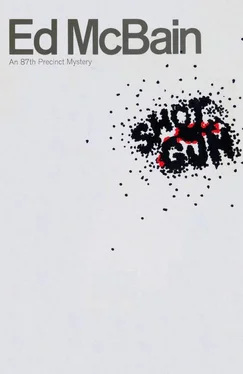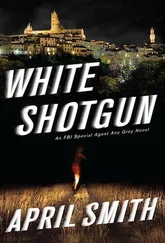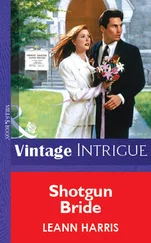The case could have been solved that very afternoon if the BCI had come up with a make on the wild prints.
They didn’t.
It was a good October.
October is the best month anyway, but this October was a rare one. There had been only one rainy day at the very beginning of the month, and clear blue skies from then on, the breezes carrying just enough bite to make topcoats necessary, but never menacing, never threatening winter itself, even though it was just around the corner.
Carella had read somewhere that this city was the second sunniest city in America, Los Angeles being the first, and today he was ready to believe it. Miami had doubtless taken a fit, not to mention Palm Springs and perhaps Fresno, but there it was in black and white in a national magazine, this city was the second sunniest city in the United States, meaning that even when it was cold enough here to freeze you to the pavement, the sun was nonetheless shining.
The sun was shining brightly that Monday morning, October 28, when he and Bert Kling left the squadroom to head downtown. Kling was coatless and hatless, his blond hair gently stirring in the breeze that came in off the river to the north. Carella was wearing a tan trench coat and feeling like a private eye. Both men came down the station steps swiftly, Kling as tall as Carella, but broader and heavier, each walking with a brisk athletic stride, pausing on the sidewalk to look up at the magnificent blue sky, and grinning, and then walking swiftly and energetically and vigorously to where Kling had parked his car up the street.
“God, what a day!” he said. “Days like this, I feel like sleeping till noon and then going to the park and sleeping some more.”
“Yeah, it’s a beauty,” Carella said.
Kling started the car. Carella opened the window on his side and breathed deeply, and smiled.
They drove downtown with no sense of urgency. The sun was dazzling on the River Harb, the cliffs on the further shore rising in sheer magnificence against a flawless blue expanse of sky. A red and green tugboat lazed its way upstream, a foghorn bleated, a single gull dipped in gray and white arcs over the filigreed water. The men discussed business only once on the way downtown, and that was when Kling asked whether the FBI had got back to them yet on the prints found in the Leyden apartment. Carella said, No, they hadn’t, and then both men put the case out of mind again.
American Tractor & Machine was located on Bixby, two blocks west of Remington Circle. It was on the tenth floor of a steel and glass structure that reflected sky and sun in a dizzying multiwindowed whirl, making the building itself seem alive. An elevator whisked them aloft, polished aluminum doors opened soundlessly, and they found themselves in a lushly carpeted reception room, the AT&M logo prominently displayed behind a sleek walnut desk at which sat a pretty blonde receptionist wearing a miniskirt. The impression was hardly one of heavy machinery. The girl was petite, perhaps nineteen, with china-blue eyes that she batted first at Carella and then at Kling after seeing the wedding band on Carella’s hand.
“We’re detectives,” Carella said, and showed her the potsy. “We’d like to talk to Andrew Leyden’s superior.”
“Oh, yes, isn’t it terrible?” the girl said.
“Yes,” Carella said.
“Isn’t it?” she said to Kling, and batted her blue eyes again, the lashes incredibly long and probably fake, Carella thought.
“Yes,” Kling said. “Did you know Mr. Leyden?”
“Oh, yes, certainly,” the girl said, and then said, “Does that make me a suspect?”
“No, not necessarily,” Kling said, and smiled.
“I thought you might be going to investigate me or something,” the girl said, and then laughed, striving for a throaty undertone that she missed completely. “Are you going to investigate me?”
“Well, not right now,” Kling said.
Carella cleared his throat.
“Who was Mr. Leyden’s superior?” he asked.
“You’ll want to talk to Joe Witters, I guess,” the girl said. To Kling, she said, “My name’s Anne Gilroy, you can remember it by saying, ‘Gilroy was here.’ ”
“I thought it was Kilroy,” Kling said.
“Yes, it used to be. But that was before I arrived on the scene.”
“Oh, I see.”
“Do you?” she said.
“Yes, I think so, Miss Gilroy.”
“I’ll buzz Mr. Witters,” she said. “What did you say your names were?”
“Detectives Carella and Kling,” Carella said.
“Which of you is Carella?”
“Me,” Carella said.
“Which means you’re Kling,” Anne said.
“Yes.”
“How nice,” she said, and lifted the phone.
Carella cleared his throat again.
“Mr. Witters,” Anne said into the phone, “there are two gentlemen here from the police, they’d like to talk to you about Andy Leyden. Shall I send them in?” She listened, her blue eyes wide. “Yes, Mr. Witters. Fine,” she said, and hung up. “You can go right in. I’ll show you where it is.” She swung her legs from behind the desk, smiled, and stood up. The miniskirt ended some three inches above her knees. A wide red belt cinched her waist, a pink blouse billowed above it, long blonde hair trailed down her back to somewhere below her shoulder blades. She had seemed like nineteen while seated behind the desk, but her practiced walk as she preceded them down the long corridor, fierce little behind jiggling, caused Carella to revise his estimate to twenty-four or — five. Every now and then, she glanced back over her shoulder to make certain Kling was watching her. He was. At the door to Mr. Witters’s office, she paused, smiled at Kling, twisted the doorknob, and then stood in the doorway so that both detectives had to squeeze past her.
“Gentlemen,” Witters said, and watched Anne Gilroy as she stepped out of the room, closing the door behind her. “Nymphomaniac,” he commented abruptly, and then said, “I understand you’re here to ask some questions about Andy Leyden.”
“Yes, sir, we are,” Carella said.
“Well, my name’s Joe Witters, as I guess you already know. I haven’t got your names.”
“Carella.”
“Kling.”
Witters shook hands with both of them. He was a white-haired man in his middle fifties, his complexion florid, his eyes a speckled green. There were liver spots on the backs of his huge hands. Monogrammed gold links showed on each cuff of his shirt, and a monogrammed gold oval held his tie in place. He had a habit of wiping his cupped hand downward past his upper lip and over his chin, as though he were smoothing an invisible mustache and beard. His speech was Midwestern, his manner distant. He seemed terribly pressed for time, even though there was not a single scrap of paper on his desk.
“What do you want to know?” he asked.
“How long did Andrew Leyden work for American Tractor and Machine?”
“Close to ten years.”
“What sort of work?”
“Salesman,” Witters said.
“Was he on the road a lot?”
“That’s right.”
“How often?”
“Six months of every year, I’d say.”
“How much was he earning?”
“Thirty-five thousand. Plus expenses. Plus stock benefits.”
“He was high-salaried, then.”
“That’s right.”
“Was he a good salesman?”
“That’s right, one of the best.”
“Know anyone who might have wanted him dead, Mr. Witters?”
“Nope.”
“Did you like him?”
“Personally?”
“Yes, personally.”
“Not too much.” Witters paused. “I don’t like anyone too much, you want to know the truth.”
Читать дальше












